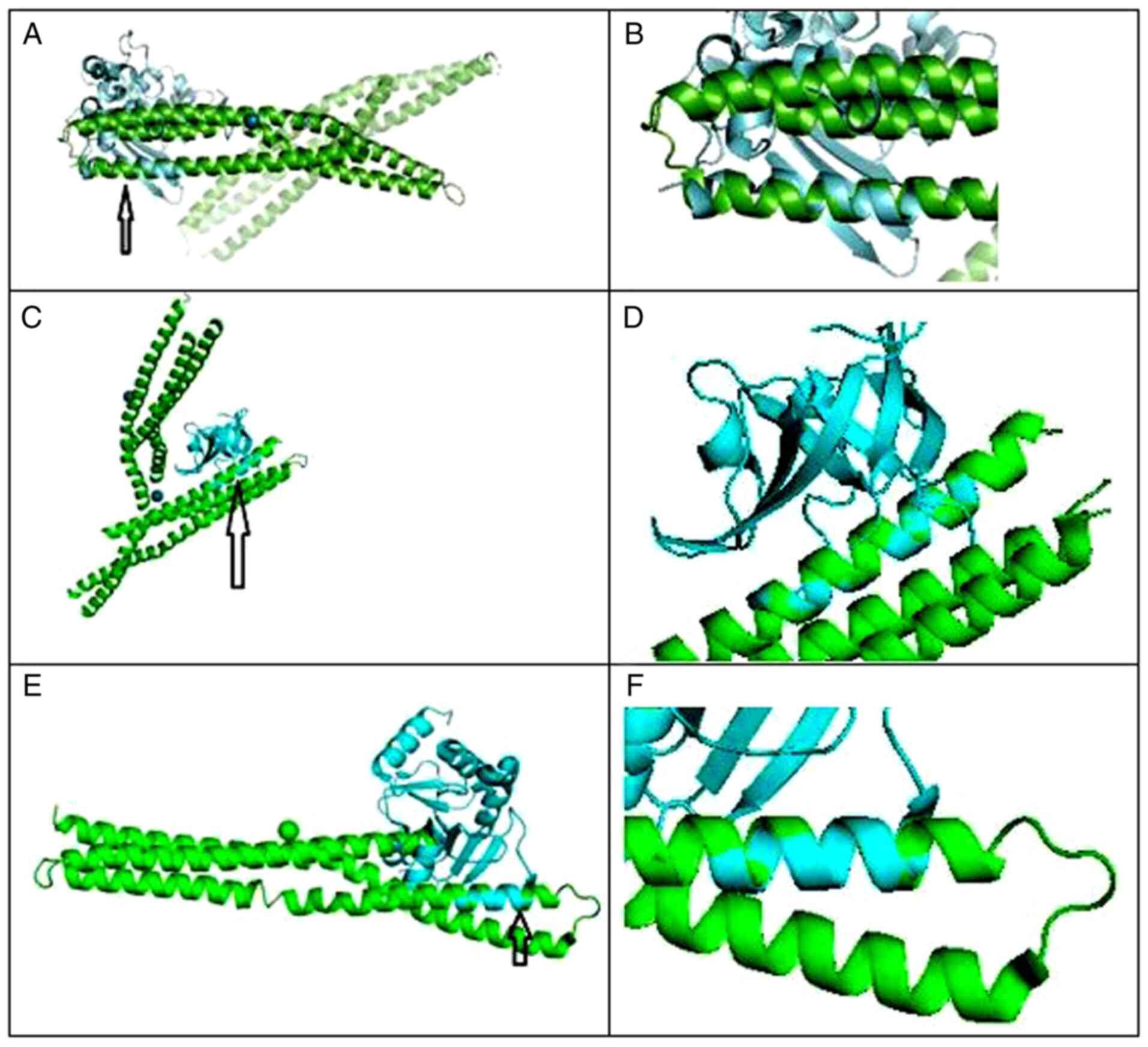|
1
|
Docherty AB, Harrison EM, Green CA,
Hardwick HE, Pius R, Norman L, Holden KA, Read JM, Dondelinger F,
Carson G, et al: Features of 20 133 UK patients in hospital with
covid-19 using the ISARIC WHO Clinical Characterisation Protocol:
Prospective observational cohort study. BMJ.
369(m1985)2020.PubMed/NCBI View Article : Google Scholar
|
|
2
|
Perry G: Alzheimer's disease patients in
the crosshairs of COVID-19. J Alzheimers Dis. 76(1)2020.PubMed/NCBI View Article : Google Scholar
|
|
3
|
Kuo CL, Pilling LC, Atkins JL, Masoli JAH,
Delgado J, Kuchel GA and Melzer D: APOE e4 genotype predicts severe
COVID-19 in the UK Biobank community cohort. J Gerontol A Biol Sci
Med Sci. 75:2231–2232. 2020.PubMed/NCBI View Article : Google Scholar
|
|
4
|
Franzmeier N, Rubinski A, Neitzel J and
Ewers M: Alzheimer's Disease Neuroimaging Initiative (ADNI). The
BIN1 rs744373 SNP is associated with increased tau-PET levels and
impaired memory. Nat Commun. 10(1766)2019.PubMed/NCBI View Article : Google Scholar
|
|
5
|
Atkins JL, Masoli JA, Delgado J, Pilling
LC, Kuo CL, Kuchel GA and Melzer D: Preexisting comorbidities
predicting COVID-19 and mortality in the UK Biobank community
cohort. J Gerontol A Biol Sci Med Sci. 75:2224–2230.
2020.PubMed/NCBI View Article : Google Scholar
|
|
6
|
Chang CC, Chow CC, Tellier LC, Vattikuti
S, Purcell SM and Lee JJ: Second-generation PLINK: Rising to the
challenge of larger and richer datasets. Gigascience.
4(7)2015.PubMed/NCBI View Article : Google Scholar
|
|
7
|
Zhu A, Salminen LE, Thompson PM and
Jahanshad N: The UK Biobank Data Parser: A tool with built in and
customizable filters for brain studies. Organization for Human
Brain Mapping Rome, Italy, June 9-13, 2019, 2019.
|
|
8
|
Zinzula L, Basquin J, Bohn S, Beck F,
Klumpe S, Pfeifer G, Nagy I, Bracher A, Hartl FU and Baumeister W:
High-resolution structure and biophysical characterization of the
nucleocapsid phosphoprotein dimerization domain from the Covid-19
severe acute respiratory syndrome coronavirus 2. Biochem Biophys
Res Commun: Oct 3, 2020 (Epub ahead of print). doi:
10.1016/j.bbrc.2020.09.131.
|
|
9
|
Frick DN, Virdi RS, Vuksanovic N, Dahal N
and Silvaggi NR: Molecular basis for ADP-Ribose binding to the Mac1
domain of SARS-CoV-2 nsp3. Biochemistry. 59:2608–2615.
2020.PubMed/NCBI View Article : Google Scholar
|
|
10
|
Casal E, Federici L, Zhang W,
Fernandez-Recio J, Priego EM, Miguel RN, DuHadaway JB, Prendergast
GC, Luisi BF and Laue ED: The crystal structure of the BAR domain
from human Bin1/amphiphysin II and its implications for molecular
recognition. Biochemistry. 45:12917–12928. 2006.PubMed/NCBI View Article : Google Scholar
|
|
11
|
Wang J, Jia Y, Zhao S, Zhang X, Wang X,
Han X, Wang Y, Ma M, Shi J and Liu L: BIN1 reverses PD-L1-mediated
immune escape by inactivating the c-MYC and EGFR/MAPK signaling
pathways in non-small cell lung cancer. Oncogene. 36:6235–6243.
2017.PubMed/NCBI View Article : Google Scholar
|
|
12
|
Abramovs N, Brass A and Tassabehji M:
Hardy-Weinberg equilibrium in the large scale genomic sequencing
era. Front Genet. 11(210)2020.PubMed/NCBI View Article : Google Scholar
|
|
13
|
Hraber P, Kuiken C and Yusim K: Evidence
for human leukocyte antigen heterozygote advantage against
hepatitis C virus infection. Hepatology. 46:1713–1721.
2007.PubMed/NCBI View Article : Google Scholar
|
|
14
|
Lapointe CP, Grosely R, Johnson AG, Wang
J, Fernández IS and Puglisi JD: Dynamic competition between
SARS-CoV-2 NSP1 and mRNA on the human ribosome inhibits translation
initiation. bioRxiv: 2020.2008.2020.259770, 2020.
|
|
15
|
Wolff G, Limpens R, Zevenhoven-Dobbe JC,
Laugks U, Zheng S, de Jong AWM, Koning RI, Agard DA, Grünewald K,
Koster AJ, Snijder EJ and Bárcena M: A molecular pore spans the
double membrane of the coronavirus replication organelle. Science.
369:1395–1398. 2020.PubMed/NCBI View Article : Google Scholar
|















